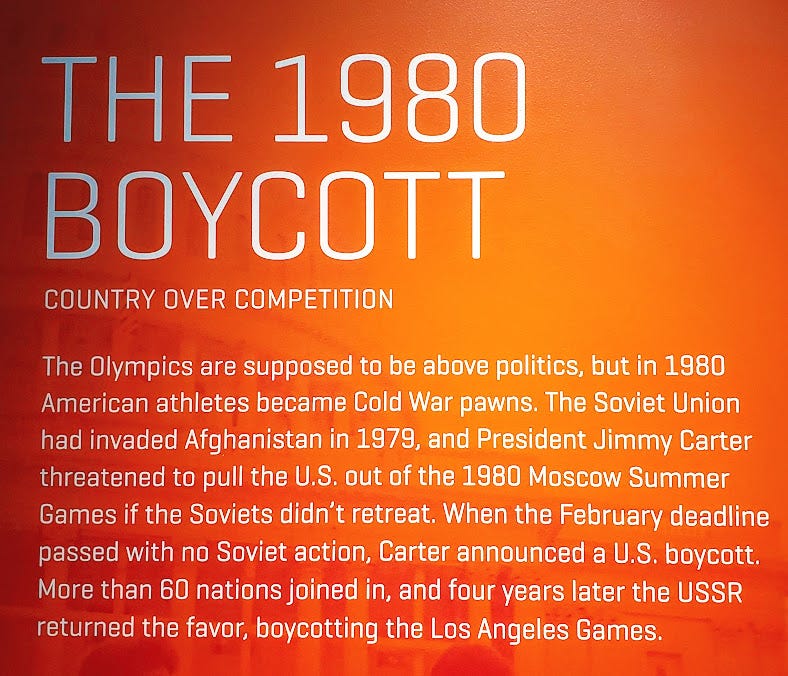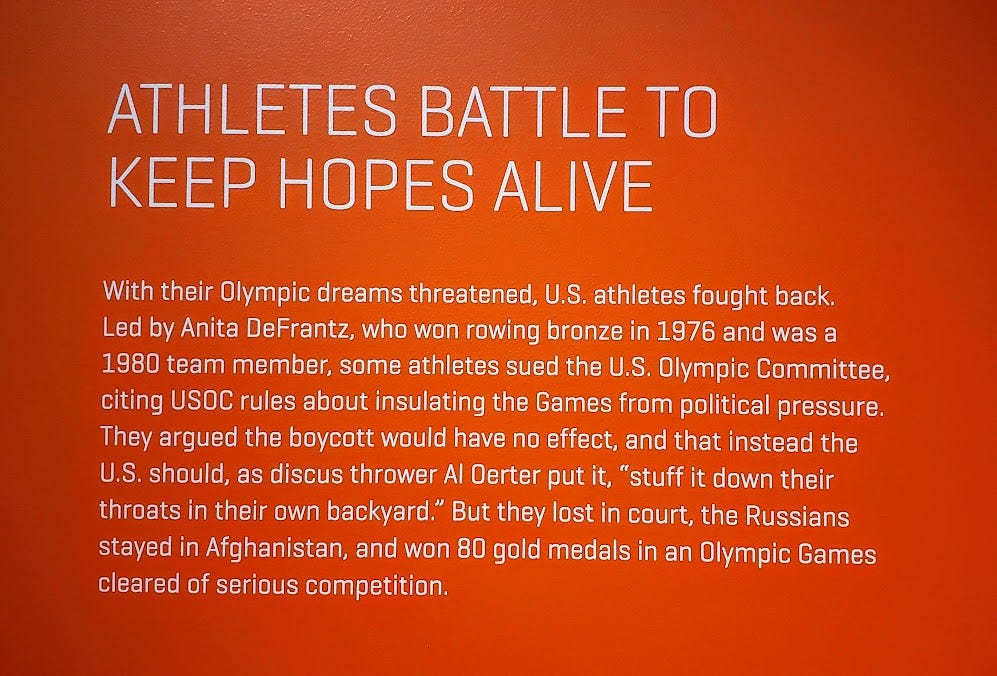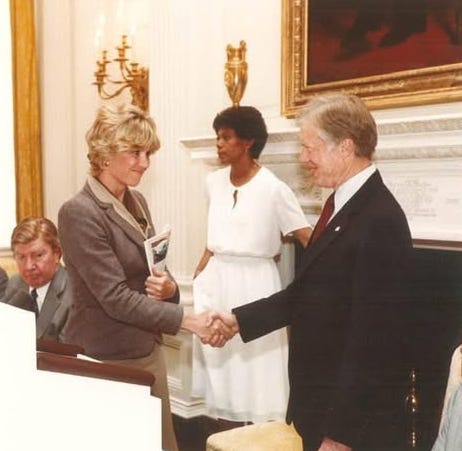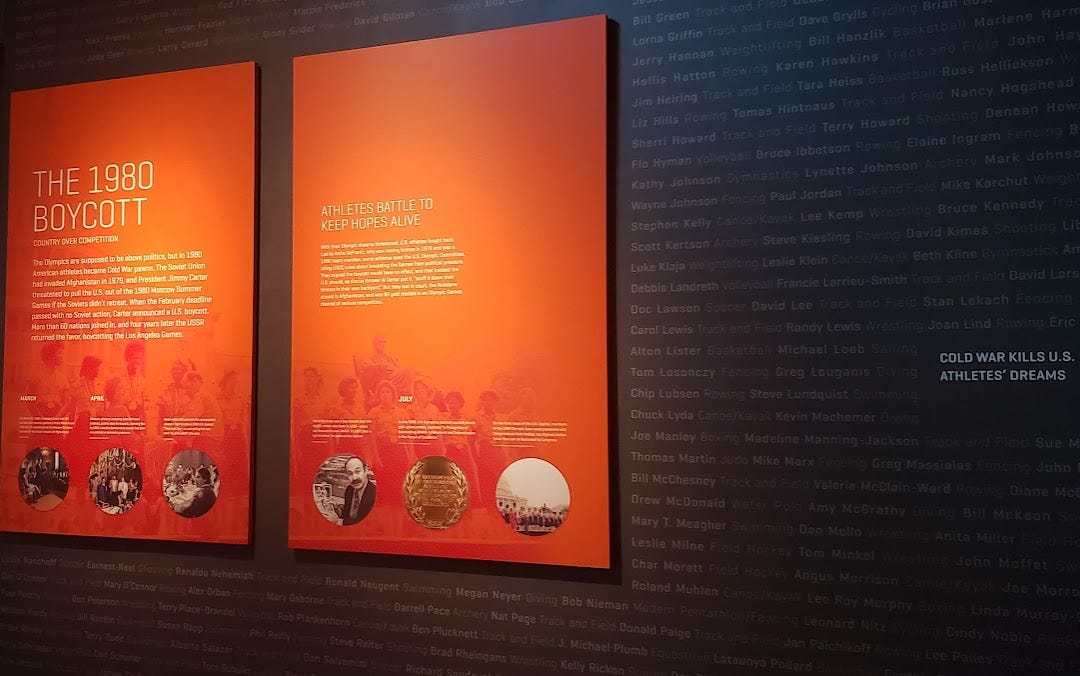For 43 years, Jimmy Carter's decision to boycott the 1980 Olympics has troubled me, despite his great post-presidential humanitarian efforts. It wasn't until June 2023, when my insider friend shared the true story of the boycott's origin after Carter entered hospice in February 2023, that I began to understand the situation more honestly. I want to share this personal journey of understanding with you.
Upon learning the truth about the 1980 Olympics boycott, a topic that had troubled me for so long, I felt a personal connection to the issue. This personal connection drove me to draft this newsletter issue immediately—a labor of love that took 19 months to complete.
Ironically, just two years before the boycott, Carter signed into law one of the most important policies in American Olympic history: the Ted Stevens Amateur Sports Act of 1978. In light of the subsequent boycott, the timing of this law signing was a twist of fate that I found both surprising and intriguingly complex.
In May 2021, I first visited the U.S. Olympic & Paralympic Museum (USOPM) in Colorado Springs, Colorado, and looked at the display below.
Flashback
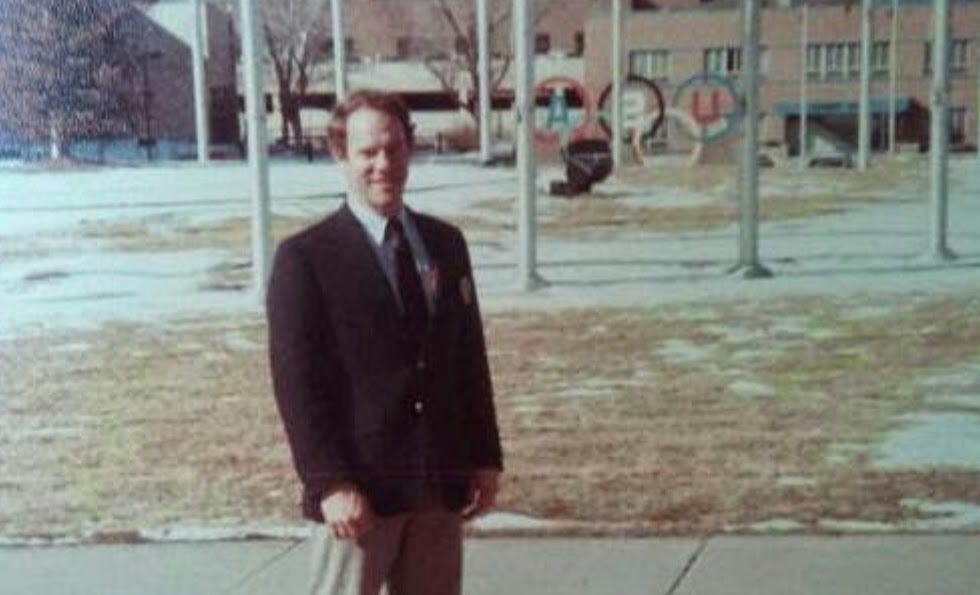
On April 12, 1980, a newly created Handicapped in Sports Committee (HISC) of the United States Olympic Committee (USOC) adjourned its meeting to allow HISC members to go to the House of Delegates meeting room at the Antlers Hotel in Colorado Springs, CO, to listen to Vice President Walter F. Mondale’s address about the possible boycott. Richard Caswell (the representative leader of the American Athletic Association for the Deaf (AAAD) to the HISC), swimming Deaflympian Kathryn Sallade [Barcroft] (AAAD’s athlete representative), and I (USOC’s at-large member) were stopped by the Secret Service due to the presence of the Vice President, preventing us from entering the large delegates’ meeting room.
However, the USOC official let Sallade and an interpreter for the deaf enter, since she was the HISC Chair, and asked Caswell and me to go to a different conference room with other non-delegates and a small television.
When I saw the sign language interpreter beside Mondale on PBS television, Caswell's and my four eyeballs popped out. The interpreter signed Mondale’s speech directly to Sallade, not the television camera.
On the following day, this interpreter told us that after coming home, she received a bombardment of online telephone calls from her friends all over the USA. She was unaware that she had appeared on television.
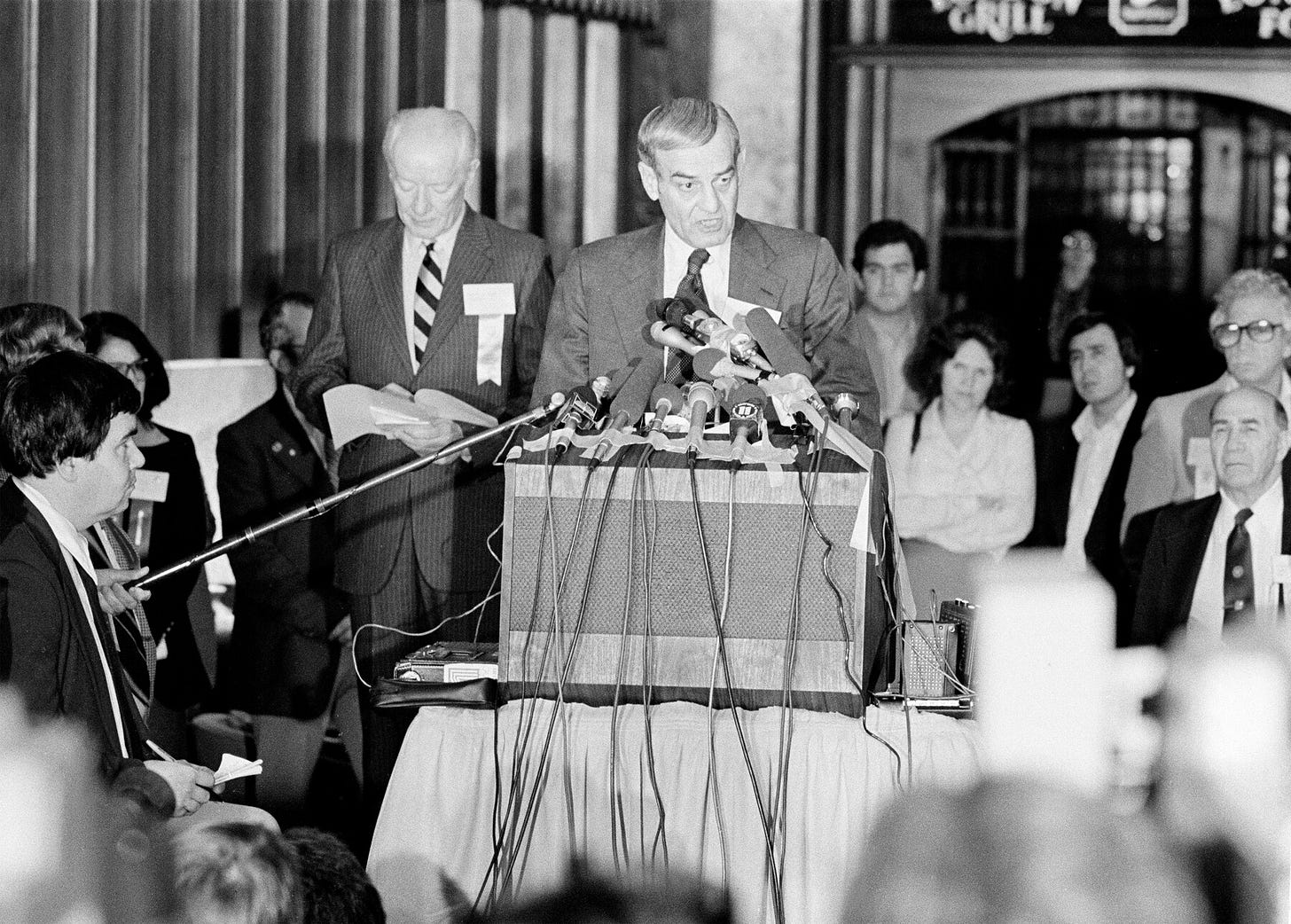
The delegates voted by secret ballot. The boycott passed with a final tally of 1,604 to 798, as delegates cast multiple votes apportioned according to the sports organizations they represented.
Please look at the second USOPM display below.
After his death, whether Carter raised the idea of a boycott remains unclear.
My answer is NO!
Today, the living survivors of the old USOC glory days and I are debating why the media has not told the true story of the boycott’s origin. However, several media outlets ran articles about the 40th anniversary in 2020 but failed to mention its origin.
On December 29, USA Today reporter Nancy Armour wrote, “Opinion: President Jimmy Carter made wrong decision to call for a boycott of 1980 Moscow Olympics.”
NOTICE:
This issue is my short investigation. After conducting more research and receiving feedback, I will try to write the full investigation report later this month or next month unless any major media outlets pick up the story about the boycott’s origin.
For example, Olympic Greco-Roman wrestling gold medalist Jeff Blatnick told his story to Mike Morgan, my trusted friend at the USOC, who had been the chief spokesman for nearly 25 years (1978-2003):
In 1984, Blatnick rode an airplane to Minneapolis while Carter was seated in the first-class cabin.
“As soon as the plane gets up in the air and levels off, he gets up and starts saying hi to everybody,” recalls Blatnick. “I say to the person next to me, ‘I wonder how this is going to be.’ He gets to me, I go, ‘President Carter, I have met you before, I am an Olympian.’ He looks at me and says, ‘Were you on the 1980 hockey team?’ I say, ‘No sir, I’m a wrestler, on the summer team.’ He says, ‘Oh, that was a bad decision, I’m sorry.’”
Another example is swimming Olympian Jesse Vassallo, who told Swimming World Magazine about meeting Carter in the reception line on July 30, 1980:
“Carter reached out to shake my hand and he said ‘How would you have done in Moscow?’” Vassallo recalled. “And I said, ‘I would have won two golds and a silver.’ And he just gave me this (pained) look. He didn’t ask anybody else that question.”
On July 30, 1980, Carter handed Congressional Gold Medals to U.S. Olympic athletes who could not compete in the Summer Games in Moscow on the steps of the U.S. Capitol. However, the medals were only gold-plated bronze, not pure gold, and their recognition in the Congressional Record did not occur until 2007, 27 years later.
Again, Donna de Varona, an Olympic swimmer, posted her praise for Carter’s humanitarian efforts on her Facebook page on December 31:
“President Carter was a great humanitarian and that is why I think he never would grant an interview about his decision to boycott the 1980 Olympics. This photo was taken at a White House gathering to convince our Olympic sponsors to continue to fund our team efforts even though we did not go to Moscow. This was an ill conceived decision to boycott the games. May no one ever suggest a boycott again. Here’s to all the athletes who suffered the denial of their talents and opportunity to be their best on the world stage and may President Carter rest in peace.”
Andy Toro, a canoeing Olympian, added his comment to de Varona’s comment:
“Thank you, Donna, to bring up the Boycott issue. All the Networks and News papers are avoided very deliberately. The peanut farmer president biggest accomplishment. I will NEVER forgive him.”
Jan Palchikoff, an Olympic rower, added her comment to Toro’s:
“I will never forgive him for the boycott AND I have enormous respect for all of his humanitarian work.”
Dick Blick, an Olympic swimmer, expressed his thoughts to de Varona:
“The original intent of the modern Olympics was to bring countries together, crossing boundaries, languages, and political views. It was when athletes came together and competed for the sake of personal achievement and to honor their country! Yes, Donna, “NEVER AGAIN” a boycott of the Olympic Games!!! Happy New Year!!!”
Then, who was the engineer behind the Boycott chaos?
Some people pointed to Cyrus Vance, the United States Secretary of State, while others thought of Alonzo McDonald, the President’s staff director, or Attorney General Benjamin Civiletti.
In his 2021 biography of Jimmy Carter, author Kai Bird tells readers that his national security advisor, Zbigniew Brzezinski, suggested the boycott. A few murmured about Vice President Walter F. Mondale. Unknown to the public, Nelson Ledsky headed the State Department’s task force on the boycott.
Rene Henry, then a sports marketing consultant, responded to de Varona’s inquiry:
“The Olympic boycott is the only blemish on his record and the person that escaped all blame was the architect of the plan, White House lawyer Lloyd Cutler. Carter was the final say but was given bad advice. The media never exposed Cutler for all of his dirty dealings and threats made to the officers of the USOC and sponsors. No president will ever achieve his humility or what he did for humanity.”
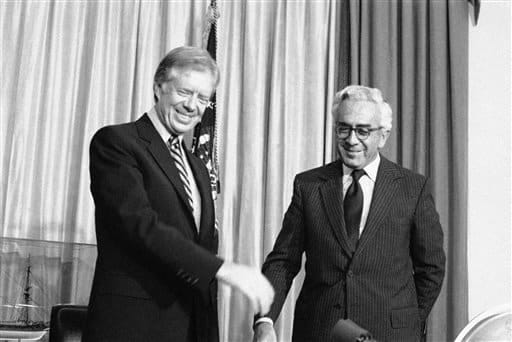
Back to the USOPM, I took the picture below. Surrounding these two displays is a list of the names of the athletes from the 1980 USA Olympic team. Look at the right side—COLD WAR KILLS U.S. ATHLETES’ DREAMS.
474 American athletes who had trained to compete in those Games for much of their lives were told they could not go.
Read the Washington Post article on January 4 (subscription required) - A tough decision for Jimmy Carter, a lost chance of a lifetime for many athletes.
Sadly, the U.S. Olympic & Paralympic Museum has failed to mention the origins of the boycott!
This museum still contains more inaccuracies in explaining the history of the U.S. Olympics.
The first error was discovered by Howard Gorrell (me); this was a misunderstanding of the display regarding the Amateur Sports Act of 1978. More details are provided in “On the Trail of Display Errors at the U.S. Olympic and Paralympic Museum.”
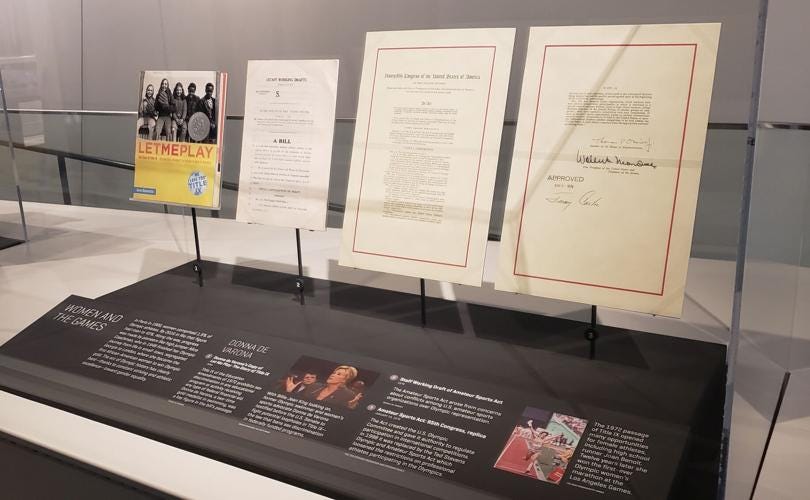
What did Architect Lloyd Cutler and his associates do?
If the USOC delegates voted against Carter’s proposal, Cutler’s team would threaten the following:
To revoke the passport of any U.S. athlete from traveling overseas.
To rescind the USOC's tax-exempt status.
To take over the Olympic Training Center property in Colorado Springs, which still belongs to the Defense Department, was related to the site’s former designation as an ENT Air Force Base.
To cancel the U.S. Army retirement benefits of USOC Executive Director Col. F. Don Miller, a decorated World War II combat officer.
To request the Internal Revenue Service to audit the USOC sponsors
To cancel the arrangement of federal subsidies to cover a projected 1980 USOC budget deficit of more than $7 million.
Etc., etc.
Most of these are mentioned in Mike Moran’s writing. He passed away in 2020.
"We were not allowed to go for a not-so-clear reason," said Edwin Moses, a legendary hurdler and two-time Olympic gold medalist, to the Associated Press on January 1, 2025.
We need your help-!
Marilyn King, a pentathlon Olympian, paused her comment to Henry:
“Was there an article written at the time? If not, it seems there are those who are fully aware of how the boycott came to be.”
My insider friend told me that mainstream and sports media should write about this and point out Lloyd Cutler as the person behind it all.
My other trusted friend told me that Carter made the decision, although Cutler and others undoubtedly influenced him. This friend reminded me of Cy Vance's ridiculous speech to the International Olympic Committee on February 10, 1980, during the 1980 Winter Olympics in Lake Placid, NY.
So, I fear getting lost in deciding which source supports Carter's decision to boycott.
I would appreciate your help, even though the boycott occurred four decades ago.
If you have any friends in mass media, please ask them to consider running an article or news report about the origin of the Boycott.
You can email me your comments or thoughts at howardgorrell@aol.com. I will forward copies to my insider friends. Please write “Boycott” in the subject line.
Thanks for your help.
Howard “Howie” Gorrell attended 13 of the last 14 Deaflympics since 1969 and is a 2004 recipient of the USADSF Jerald M. Jordan Award, given to those who exhibit leadership and continuous participation toward the goals of the Deaflympics, and the 2011 Art Kruger Award for demonstrating leadership, constant participation, support, and contributions to the USA Deaf Sports Federation (USADSF) over an extended period.



